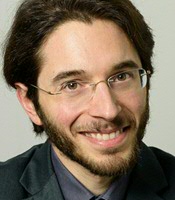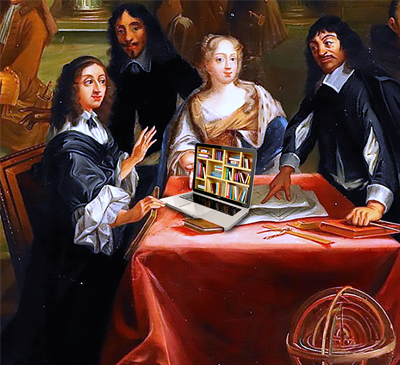Een nieuwe blik op de filosofische canon door Artificial Intelligence

Door publicatiedruk en bureaucratische rompslomp moeten universitaire filosofen zich steeds vaker beperken tot ‘enkele grote werken van enkele grote auteurs’. Dat is problematisch wanneer je kerntaak diepe bezinning is, en al helemaal als je een accuraat en compleet beeld wilt schetsen van een van de meest invloedrijke filosofische takken uit de geschiedenis: de vroegmoderne natuurfilosofie. Dr. Andrea Sangiacomo van de Faculteit Wijsbegeerte schakelde daarom de hulp in van het team Data Science van het Centrum voor Informatie Technologie (CIT) dat met behulp van Artificial Intelligence tot verfrissende inzichten kwam.
Auteur: Jorn Lelong
“Ons hele beeld van de vroegmoderne filosofie is gebaseerd op de werken van vijf auteurs. Natuurlijk is dat ongelooflijk vertekend. Maar wat is het alternatief?” Dat was de vraag waar Andrea Sangiacomo, al een tijdje mee worstelde. Het was Spinoza die bij hem interesse in de vroegmoderne natuurfilosofie wekte, de periode (17e-18e eeuw) waar filosofie en wetenschap met elkaar vervlochten waren. Vanwege de grote wetenschappelijke ontwikkeling die toen plaatsvond, wordt vroegmoderne natuurfilosofie ook wel als de voorloper van moderne wetenschap gezien. Tegelijk is het een filosofisch rijke periode die enkele auteurs voortbracht die tot op de dag van vandaag menig filosofiecursus domineren: Spinoza, Descartes, Hume, Locke, Newton en, althans volgens sommigen, Kant.
AI als redmiddel
Maar door te focussen op die belangrijkste figuren, is ons beeld van de vroegmoderne periode allesbehalve representatief, ondervond Sangiacomo. “Ik besefte dat ik nooit een compleet beeld van die periode zou kunnen hebben. Want als er in realiteit wel duizend filosofen actief waren in die periode, wat baat het dan om tien à vijftien namen aan de bestaande canon toe te voegen? We hebben nieuwe tools nodig.” Daarom keek Sangiacomo naar andere onderzoeksvelden die met gelijksoortige problemen kampten. Geïnspireerd door het werk van Franco Moretti, die met machine learning-modellen de literaire canon probeerde te doorbreken, zag hij in Artificial Intelligence een welkom hulpmiddel.

Call for proposals Data Science
Het onderzoek van Sangiacomo was een van de gehonoreerde projecten van de jaarlijkse call for proposals voor data science van het Centrum voor Informatie Technologie (CIT). Hiermee ontving hij 450 uur ondersteuning van het team Data Science van het CIT. Samen met data scientist Cristian Marocico bekeek Sangiacomo hoe wetenschappelijke begrippen tussen de 17e en 18e eeuw evolueerden. Ze maakten daarvoor gebruik van ShiCo (Shifting Concepts through Time), een door het Netherlands eScience Center en de Universiteit van Utrecht ontwikkelde open-source tool om verschuivingen van woorden in historische context te analyseren.
70.000 brieven
Natuurlijk kwam er enig sleutelwerk aan te pas. ShiCo was ontwikkeld om conceptuele verschuivingen in krantenberichten uit de 20e eeuw te registreren. Data scientist Marocico paste het model aan, zodat het algoritme aan de slag kon met 70.000 brieven die filosofen en academici tussen de 17e en 18e eeuw met elkaar uitwisselden. Dat reusachtig corpus, bestaande uit voornamelijk Engelse, Franse, maar ook wat Portugese en Latijnse brieven, haalden ze uit de Oxford Electronic Enlightenment database. Daarin gingen ze kijken welke woordassociaties bij bepaalde wetenschappelijke begrippen gevormd werden, en hoe dit veranderde in de loop der jaren. Soms leverde dat opmerkelijke resultaten op. “Zo vonden we dat in de 17e eeuw het Engelse woord ‘spirit’ zowel in chemische betekenis als religieuze betekenis gebruikt werd. In de 18e eeuw zien we echter dat het woord de chemische betekenis verloren heeft. Het toont maar aan hoe begrippen veranderen. Of hoe bijvoorbeeld een 17e -eeuws werk een andere betekenis in de 18e eeuw kan krijgen. Dat heeft ook invloed op welke auteur de tand des tijds doorstaat, en welke niet,” zegt Sangiacomo.

Het belang van een netwerk
Ook sociale relaties hebben een niet te onderschatten rol op de populariteit van bepaalde filosofische theorieën, ondervond Sangiacomo. Daarom wilde hij, naast de verschuivingen van betekenissen, ook de onderlinge verstandhouding en netwerken van de vroegmoderne filosofen in kaart brengen. “A priori zijn er geen duidelijke redenen waarom bepaalde filosofische theorieën veel populairder worden dan andere. Door de geschiedenis heen zie je soms dat erg gekke ideeën mainstream worden, terwijl goede ideeën aan de kant geschoven worden. Om dat te verklaren, moet je naar de sociale relaties kijken, want mensen zijn de echte brandstof van de geschiedenis. Wat dat betreft biedt dit project heel veel informatie.”
Positie vrouwelijke filosofen
In een van de deelonderzoeken die Sangiacomo uitvoerde, focuste hij bijvoorbeeld op de positie van vrouwelijke filosofen in de vroegmoderne tijd. Want ondanks dat er heel wat belangrijke vrouwelijke filosofen in die tijd waren, behoren ze vandaag de dag niet tot de canon. En worden hun bijdragen dus snel over het hoofd gezien. “Ik was verbaasd hoeveel vrouwelijke filosofen er waren, en hoeveel connecties ze hadden – ook met de filosofen die ons vandaag wel bekend zijn. Maar tegelijk zie je dat vrouwelijke filosofen weinig contact onderling hadden, en altijd afhankelijk bleven van het netwerk van een bekende, mannelijke auteur.”
Lab-microscoop
Afhankelijk van welke parameters je invoert, kun je met het machine learning-model dus heel wat verschillende hypotheses testen. “Als het algoritme eenmaal is getraind, is het eigenlijk een geavanceerde zoekmachine, die je makkelijk kunt aanpassen naargelang je onderzoeksvraag”, legt data scientist Cristian Marocico uit. Sangiacomo gebruikt een andere vergelijking. “Telkens als ik op een nieuwe vraag kom of ergens nieuwsgierig over ben, kan ik naar de tool teruggaan en hem daarop afstellen. Eigenlijk moet je het zien als een microscoop in een lab. Die schuif je ook niet aan de kant na één succesvolle observatie.”
Het blijft mensenwerk
Hoe verfrissend ook, Sangiacomo staat voorlopig nog alleen met zijn aanpak. “Veel collega’s vinden filosofie nog zuiver mensenwerk. En vergis je niet: ik ben het daar grotendeels mee eens. De meest relevante filosofische inzichten worden nog steeds gedaan door mensen die diep nadenken.” Volgens hem is het vooral belangrijk om goed te weten wat je met je onderzoek wil bereiken, en hoe andere technieken, zoals data science, daarbij kunnen helpen. “Data science kan erg nuttig zijn, maar je moet jezelf wel altijd de vraag stellen: zijn deze dingen filosofisch relevant? Uiteindelijk levert het je enkel cijfers. Voor de interpretatie van die cijfers ben je nog steeds heel erg op je eigen denken aangewezen. Maar gelukkig is dat wat wij filosofen graag doen.”
ERC-beurs
Voor het vervolgproject van het onderzoek heeft de European Research Council (ERC) een onderzoeksbeurs van 1,5 miljoen euro toegekend aan Andrea Sangiacomo. De ERC ondersteunt talentvolle jonge onderzoekers bij het opzetten van een onderzoeksteam en het starten van een baanbrekend onderzoeksproject.
Meer informatie
Meer nieuws
-
08 december 2025
Burgerparticipatie onmisbaar voor een duurzame energietoekomst
-
02 december 2025
Vertrouwen in de wetenschap vraagt om integere communicatie
-
28 oktober 2025
De zoektocht naar verantwoordelijkheid in de financiële wereld
